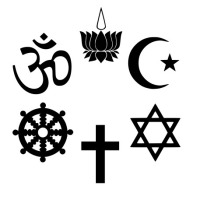
For example, a friend was perplexed after his brother died. One of the many cards he received was a Mass card and it came from his brother’s colleague. My friend is Jewish and he didn’t know what a Mass card was and had no idea who to ask. Unless you are Catholic, you may not know what a Mass card is either. Members of the Catholic faith send Mass cards to let a bereaved family member know their loved one will be remembered and prayed for at a Catholic Mass. Mass cards can be purchased at a local parish but they are sometimes available by phone or online. The sender usually arranges for a date and time for a Mass to be said for the bereaved. While you don’t have to be Catholic for a Mass to be said for you, it is important to think how the bereaved recipient will feel getting a religious offering that is not of their faith. Or, like my friend, have no idea what the sympathy gesture represents.
I can remember how confused I was when attending my first visitation since my faith does not hold visitations nor do we have an open casket. The visitation was for a neighbor and I stood in line at the funeral home with another neighbor. I was able to ask what was expected and she quickly filled me in. When I approached the bereaved spouse, I took my cues. She was receiving visitors with her brother and she introduced me. I knew to express my condolences to them both and acknowledge the open casket to their left. After greeting a few other neighbors, I comfortably left the visitation.
While discussing this topic with another friend, she confided that her husband’s office made a mistake when a Jewish colleague’s spouse died. Not knowing Jewish mourning customs, the office sent flowers. It wasn’t until later that they learned that you do not send flowers when someone of the Jewish faith dies. Those who practice Judaism believe that flowers are for the living. It is more appropriate to honor the deceased by making a donation in their memory.
Robbie Miller Kaplan is an author who writes from a unique perspective as a mother who has lost two children. She has written How to Say It When You Don't Know What to Say, a guide to help readers communicate effectively when those they care about experience loss, available in ebooks for "Illness & Death," "Suicide," "Miscarriage," "Death of a Child," "Death of a Stillborn or Newborn Baby," "Pet Loss," "Caregiver Responsibilities," "Divorce" and "Job Loss." All titles are in Amazon's Kindle Store.
Images via Wikimedia Commons, Cott 12
Copyright Legacy.com Used with permission
 RSS Feed
RSS Feed
